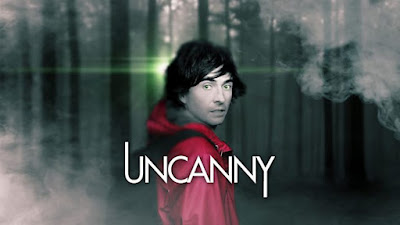Tales of terror in the age of the podcast
A GREAT, grey block of student accommodation built in the 1960s is the very last place that you'd expect something so utterly unnerving to happen.
Yet the non-descript dorm rooms of Belfast's Allenbrooke Hall have proven the star attraction of BBC radio series and podcast Uncanny - billed as the single biggest investigation of the supernatural ever.
It's a bold claim, but turning over cases to an army of social media sceptics and believers alike certainly feels a step change from three men with night-vision cameras in a cellar somewhere in Bracknell.
Presenter Danny Robins came to fame as the writer of 2:22 - a smash-hit play which poses the question of just what a ghost story should look like in 21st century Britain.
In an era where many people are more used to getting their fix of fear from true crime or - perhaps rather grimly - the news, it's interesting to see what far older, arguably primordial fears appear like in the modern-day.
Uncanny, launched in 2021 and now mid-way through its second series, is superficially similar to Robins' stage production in that it's broadly about ordinary people in mundane settings encountering something truly terrifying.
The crucial difference for listeners is that it isn't a fiction anymore. Those ushered in each week to tell their story are introduced as witnesses. And as the haunting (in more ways than one) lyrics of the intro music intone they "know what they saw."
That's not to say Robins ditches the drama altogether. The show makes superb use of sound effects and music to immerse the listener in each personal account.
There is also something of the stage play structure, with each interview deftly divided up into acts.
Breaking away to discuss the case often just as events and anxiety levels are escalating ratchets up the tension. And with each return to the story Robins gives a warning to the effect that things are about to get "much, much more sinister."
In these moments and given the almost confessional nature of each interview the series leans heavily into the traditional ghost story. Episodes often open with prose-like pencil sketches of each witness - "a tall man in his early fifties with lightly greying hair", that sort of thing.
And yet as the Allenbrooke Hall case, which was the focus of the very first episode and has been returned to several times since, shows, Uncanny has also obviously modern sensibilities.
When we think of tales of the unexplained we're understandably drawn to old country churchyards and rambling mansions. The people to whom strange things happen have, ironically enough, become spectres themselves- all dressed in old clothes and from a time long passed.
In some respects evoking the late Victorian/early Edwardian era - perhaps the golden age of the British ghost story - feels entirely appropriate. This after all was the era of the genre's obvious master M.R James.
But those who find Uncanny's decision to focus on student digs or suburban semis jarring should look less to James' canon of short stories and more what the writer said himself about their formula.
James often spoke of the "haze of distance" in choosing the right time for a tale, suggesting that 30 or 40 years ago would be perfect. A university campus in 1980s Northern Ireland, still gripped by the violence of The Troubles, feels perfect.
The Cambridge scholar also roundly rejected the idea of grey ladies or helpful spirits. Ghosts, in his mind, should always be "odious or malevolent".
Here again the story of nocturnal visitations at Allenbrooke comes up trumps; our witness describes a black shape appearing at his bedside which oozed a sense of "pure, distilled evil."
Even the witness himself, a respected geneticist called Ken now in late middle age, feels somehow Jamesian in character - the writer had a preference for scholarly types whose rational instincts are confounded by nightmarish encounters.
Robins introduces Ken, who was a young science student at the time things started going bump in the night, as someone quite certain there is no such thing as ghosts - even though he appears to have seen one.
In some ways the softly spoken Northern Irishman feels similar to Prof Parkin, the affirmed unbeliever who has a rather nasty experience in Oh Whistle and I'll Come My Lad - perhaps James' most celebrated story.
Room 611 - the deceptively plain title of the opening instalment - is a very similar story of something inexplicable, something not even obviously human, emerging from out of the darkness.
But it has the obvious advantage that it's in a time not long ago and in a setting that still feels familiar; no longer do we have the reassuring thought that this sort of thing doesn't really happen anymore.
Uncanny has also flirted with other mysteries, with a couple of UFO cases and the occasional appearance of a "strange beast" - last week's edition told the story of a couple of backpackers who found themselves encountering a "goat", or possibly something rather worse than a goat, in the grounds of a French castle.
But it's in Britain and with ghosts that the show is perhaps at its most comfortable and its least comforting.
- Uncanny series two is currently on Saturdays on Radio 4 at 11.30pm. All previous episodes are available on BBC Sounds (although the late night broadcast is recommended).





Comments
Post a Comment